religious extremism
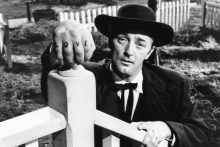
ECCLESIASTES 1:9 TELLS us “What has been is what will be, and what has been done is what will be done; there is nothing new under the sun.” I used to read that verse with a sense of existential fatigue, but as I’ve grown older, it reminds me that the struggles we face now are different forms of struggles as old as time itself. As hard as things might get, we’re never without hope that good will come back around, because it has before.
Examples of this exist in art as well as scripture. Take, for example, the 1955 film The Night of the Hunter, which addresses religious extremism, hypocrisy, and spiritual abuse. Director Charles Laughton’s dark and impressively modern approach to those ideas didn’t sit well with audiences at the time, but 70 years later, the film has only grown in influence.
Laughton’s film follows Harry Powell (Robert Mitchum), a Depression-era preacher who funds his “ministry” by marrying widows and killing them for their money. We watch Powell court, manipulate, and murder a guilt-stricken woman, Willa (Shelley Winters). Willa’s children, John (Billy Chapin) and Pearl (Sally Jane Bruce) escape Harry’s clutches and find refuge with Rachel (Lillian Gish), a kind woman who helps them recover from their trauma.
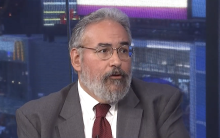
In 2008 Rabbi Brad Hirschfield published You Don’t Have To Be Wrong For Me To Be Right: Finding Faith Without Fanaticism. In this book, he talks about his own first-hand experience of falling into fanaticism and what it took for him to climb out of it. I was fascinated by this perspective then, and given what’s happening in our world today, I’m even more fascinated by it now.

Cherian George: "One of the bitter ironies is that the extreme right the world around, although they may detest each other, are remarkably similar in the way they operate and in their world views. They believe in a certain purity of identity. They often use similar tactics."
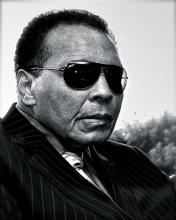
Muhammad Ali aimed a powerful and impassioned message at Republican presidential candidate Donald Trump on Dec. 9, saying that the recent global terrorism crisis has “perverted people’s views on what Islam really is.”
Ali became a Muslim and changed his name from Cassius Clay during the height of his career as one of the greatest boxers in history. His message came in a statement following a week in which Trump cast doubt on President Barack Obama’s assertion that several American “sporting heroes” practiced Islam.
“I am a Muslim, and there is nothing Islamic about killing innocent people in Paris, San Bernardino, or anywhere else in the world,” Ali said.
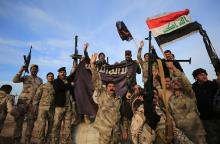
As an evangelical theologian and pastor, I want to say that ISIS is evil. Evil is a term we don’t normally hear in the media or politics, which is likely a good thing given our lack of public morality and civility these days. Indeed, judgementalism was condemned by Jesus, but is still often practiced by many churches — so humility is always called for. But it is still a responsibility of the faith community to name evil where it clearly exists in the world. And by any standards, the actions of ISIS are evil.
The latest report issued by the Office of the UN High Commissioner for Human Rights and the UN Assistance Mission for Iraq on “The Protection of Civilians in Armed Conflict in Iraq,” catalogues the human rights atrocities committed by ISIS, making it abundantly clear that this group is evil. They include:
- attacks directly targeting civilians and civilian infrastructure,
- executions and other targeted killings of civilians,
- abductions, rape and other forms of sexual and gender based violence perpetrated against women and children,
- slavery and trafficking of women and children,
- forced recruitment of children,
- destruction or desecration of places of religious or cultural significance,
- wanton destruction and looting of property, and denial of fundamental freedoms.
The report goes on to identify the targeting of ethnic and religious groups — such as Christians, Yazidis, Shi’ite Muslims, and many others —and subjecting them to “gross human rights abuses, in what appears as a deliberate policy aimed at destroying, suppressing or expelling these communities permanently from areas under their control.” The report describes the actions as possible “war crimes, crimes against humanity, and possibly genocide.”
In light of these sober findings, the faith community must remind the world that evil can be overcome, and that individuals involved in evil systems and practices can be redeemed. But how to overcome evil is a very complicated theological question, which requires much self-reflection. In trying to figure out how to overcome evil, it is often helpful to first decide how not to. Here is a good example of how not to respond to the reality of evil.
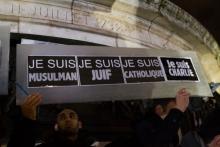
Our first response to the horrible and frightening violence of Paris should be grief. False religion always makes the religious grieve, but when it engages in ghastly violence against other human beings who are made in God’s image, it should break our hearts as it breaks God’s.
These hateful terrorists, masquerading as religious believers, said on video they were the “avengers” of the prophet Mohamed. As such, they murdered cartoonists in the office of a magazine they identified with blasphemy. What these killers, and those like them, don’t understand is that they are the real blasphemers now by forcing their false and murderous distortions of Islam on the world and on other children of God. Their religion is now violence itself, a blasphemous interpretation of Islam, which in its truest expression is a religion of peace. Rev. Wes Granberg-Michaelson, from the Reformed Church in America, has called Paris an “identity theft” of the Muslim faith. Several Muslim leaders have said that the damage terrorists like these do to the image of the Prophet Mohammed is much greater than any cartoonist could ever do.
While the tenet of freedom of speech has been invoked throughout the media coverage of the attacks, the religious implications here run much deeper. They are about how we in the faith community should respond when we are attacked by those who disdain us, disrespect us, distort us — as many believe the satirical French magazine, Charlie Hebdo regularly did — and even viciously attack us. The magazine has often crudely, provocatively, and even gleefully satirized all religions in very offensive ways, suggesting that the fundamentalisms in all our religious traditions completely define the meaning of faith. Charlie Hebdo is apparently driven by its own ideology of secular fundamentalism, which regularly strikes out at all people of faith.
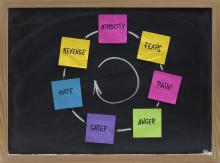
After my article on the terrorism in Paris last week, readers offered some thoughtful critiques of my position. Their comments zero in on the difficulty inherent in sorting out responsibility for violence without blaming victims or excusing perpetrators. My effort, however flawed, in analyzing this instance of violence had one goal in mind: to discredit our methods for justifying violence. What seems to have elicited the most concern is my use of the image of a dragon to discuss René Girard’s concept of the sacred. I pointed out that the editors at Charles Hebdo unapologetically embraced radical secularism. They believed that sacred structures are not only as dead as a mythical dragon, but that they have no function in modern society. I begged to differ, not because I am a fan of the archaic sacred, as Girard calls it, but because I am extremely concerned that continuing to remain ignorant of the way it functions in modern society is the greatest global threat we face today. Here are four things you need to know about the relationship between the archaic sacred and violence and how that relationship threatens our world:
1. Categorical Confusion
The archaic sacred is also called the false sacred because it generates a world in which false differences appear to be true. We see this dynamic clearly in the actions of terrorists who believe in a false difference between legitimate targets for violence (Western secularists, for example) and victims of violence who must be avenged (their religious and national compatriots). We easily condemn them for justifying their own violence with self-righteous fervor. Trying to expose the difference humans have constructed as categorical lies is the driving force behind our work at the Raven Foundation.
Let me be clear: No human being is a legitimate target for violence, period. To say otherwise is indeed to blame the victim and excuse perpetrators. However, to defend victims of violence by glorifying their deaths or sanctifying the values that apparently got them murdered is to play into the hands of the archaic sacred. Why? Because by explaining why these victims did not deserve to die, we indirectly acknowledge the possibility that some victims might indeed deserve what they get. In other words, the victims of the Paris terrorism are not to be mourned because they were good, noble, or saintly people. It wouldn’t matter if they were liars, cheats, and murderers – no one needs to earn the right to NOT be murdered. To hang on to the difference between those who deserve to die and those who don’t is to hang on in confusion to a false difference that serves only one purpose – to sanctify violence and ensure its continued presence as a plague in our world.
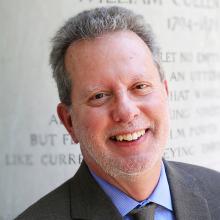
When I was a child, I lived in a black-and-white world of all-this or all-that.
Humankind meant my family. The world meant my neighborhood. Religion meant my church. Politics meant my father’s beliefs.
Oh, I was aware that more was out there, but it had little claim on my imagination or loyalties. My world was complete. There were no gray areas, no compromises, no maybes.
That was a child’s view, reality writ small. In time, I advanced beyond it, until the world became large, complicated, and gray, with places beyond imagining, people totally unlike anyone I knew, ideas beyond anything I heard at my parents’ table.
It’s called growing up. Discovering through knowledge and experience that the little I grew up knowing wasn’t enough to know.
We are witnessing today a headlong retreat into the not-knowing and simplistic partisanship of childhood. Ideas that make people uncomfortable are banished. Science that calls faith into question is shouted down. Politics isn’t just hardball, it’s dumb-ball: I must win, at any cost, and you must lose. I am right, and you are wrong. My tribe is the only tribe that has value and rights.
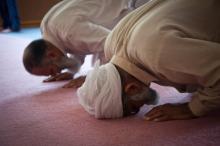
Muslims in America are much less inclined to support suicide bombing than other Muslims abroad, and are more likely to believe that people of other faiths can attain eternal life in heaven, according to a new report released Tuesday by the Pew Forum on Religion & Public Life.
“The World’s Muslims” report looks at Muslim views across seven categories: Islamic law; religion and politics; morality; women; relations among Muslims; interfaith relations; and religion, science, and pop culture. There is also a special section on U.S. Muslims.
Of the countries surveyed, only a majority of Muslims in America — 56 percent — believe people of other faiths can go to heaven; by contrast, that figure among U.S. Christians is about 64 percent. U.S. Muslims are also less likely than Muslims abroad to believe in evolution, sharing views that are closer to those of U.S. Christians.
On suicide bombing, 81 percent of U.S. Muslims said it was never justified, 7 percent said it was justified to “defend Islam,” and 1 percent said it was “sometimes justified.”

Radical monotheism. It sounds like a frightening term, when there are fundamentalist Christians and Muslims around the world and here inside our own borders, religious folk who want to turn our nation-states into theocracies under gods crafted according to their own images. When we think of radical monotheism, we hear, “My god is bigger than your god. No, wait: Your god’s a fake!”
But theologian H. Richard Niebuhr proposed a kinder, gentler, more generous idea of radical monotheism. He was writing between the Korean and Vietnam wars, as the clash between two “social gods” — capitalism and Marxism — bloodied the globe: